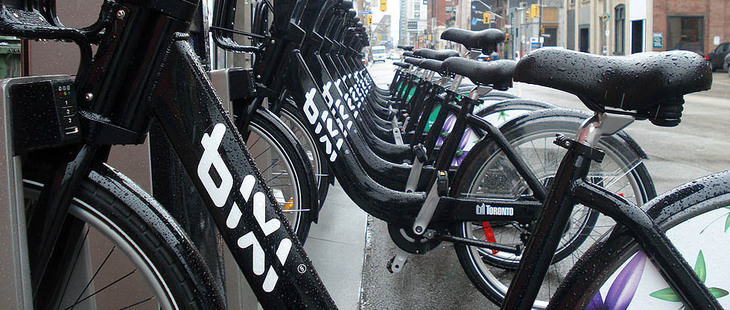
I never did understand why the Trojans thought it would be a good idea to haul that horse into their city. Yes, it must have been a pleasant novelty, after a ten-year siege, to look over the parapet and see the Greek army gone, and an outsized horse there instead. Clearly the civic leadership wasn’t considering the law of unintended consequences, which states that there usually are some.
Here in Toronto, the arrival of the Bixi bike-share system marks a similar marvel: Somehow, it escaped the knife of the Ford administration, which has been cheerfully going out of its way to cancel other contracts that might displease motorists, even if it means wasting millions in taxpayer dollars. Yet the Trojan bike is here: Hulking racks full of hundreds of squat black bicycles, just waiting to pop out and fill the streets. And having slipped through the gates, Bixi could do more for the cause of biking in Toronto than years of well-meaning but ineffective planning.
The bike-share system is an import from Montreal, which in turn cribbed the concept from Paris. Bixi has already successfully deployed networks in London and Melbourne, and if the Toronto franchise turns out to make money, it will split its profits between the city and its owners. Bixi bikes can be rented out either by members who pay $95 for an unlimited annual pass, or rented on a one-off basis with a credit card. (The one-off rates, however, are punitive, and the ticket-purchasing system is torturous.)
The technology is whiz-bang and the premise is idealistic, but Bixi has its work cut out for it here. It’s an awkward fit in Toronto, and its arrival has highlighted the fact that, as enthusiastic as its cyclists might be, Toronto is simply a lousy place to ride a bike. When you rent a Bixi in Montreal, for instance, the city opens up before you. Not only does Montreal have bike lanes, but real bike routes, separated from road traffic with a curb, and clearly marked routes through pretty side-streets. It has paths that lead cyclists through waterfront vistas to interesting destinations.
Toronto, on the other hand, turns a Sunday bike ride into a kind of joyless extreme sport.
My mother was in town last week. I thought about renting Bixi bikes and going for a downtown ride, until I actually imagined launching her onto a Toronto street on one of those things. Nobody has ever said, “Hey Mom, let’s rent bikes and go for a ride down Queen Street,” unless they enjoy the sound of their white-knuckled mother screaming blue murder from ten feet behind.
In Toronto, either you ride in traffic, or you hardly ride anywhere. Cyclists – like myself – get so used to it, we only notice when we go over the handlebars. Biking means navigating the rutted streets, the freaked-out drivers, the streetcar tracks, the bike network so fractured it looks like an x-ray of the average cyclist’s wrist. The bike lanes we do have drag cyclists past endless lines of parked cars, each with a spring-loaded door, before raking them over strategically placed potholes. (In fact, by offering a false promise of security, these half-baked efforts might be worse than nothing.) Where Toronto’s bike lanes end, it’s back to a tumult of drivers and parked cars and streetcars and unpleasant cyclists who blow red lights with a listless “fuck you” to the world at large. Seven years of progressive governance at City Hall led us to this place. Now, to top it off, we have an administration with a four-wheels-good, two-wheels-bad agenda that started its term in office with insult comedian Don Cherry’s memorable invective against “pinkos who ride bicycles.”
And into the midst of all of this, we add Bixi. I took a Bixi for a spin around the trial area last weekend (without risking my mother’s hide). The first thing you notice, getting onto the bike, is that it turns you into a different kind of cyclist. Bixis are comfortable and offer a surprisingly smooth ride. But they aren’t built for speed; they’re built for sturdiness. These are not unobtrusive machines. Where I’d normally nip across an intersection on my city bike, on a Bixi, I rumbled past drivers like a piece of field artillery.
Since Toronto has little dedicated bike infrastructure, Bixis represent a new class of even slower-moving traffic that will be sharing the road. And if Bixi succeeds in drawing tourists and casual users onto bikes, the roads will be further populated by people who don’t know the city, don’t know how to ride a bike in traffic, don’t know how to bike at all, or all of the above. (I pondered this as I watched a Bixi whiz off the wrong way up Adelaide.)
But if Bixi’s little bikes are an awkward fit with Toronto’s hostile streets, they’re useful enough that they’re making a place for themselves anyway. Subscribers wander downtown, waving their iPhones like tricorders, scanning for the nearest Bixi rack, calculating whether it would be faster to ride between two stations or just walk. In the Annex, I came across a group of young journalists visiting from Russia, clambering aboard a handful of Bixis. They couldn’t really comment, since they didn’t speak English, but they extracted their bikes without incident and rolled off onto Bloor.
There’s a sympatico here. Toronto is hostile, but Bixis are rugged. The city’s not ready for them, but what the hell, we’re going to flood the zone anyway. In the end, it’s a magnificently Torontonian approach: Not master-planned so much as wedged unceremoniously into the downtown core. In fact, as they become more prominent on our streets, Bixis will reshape our expectations of what belongs on a road and what doesn’t. By drawing non-bike owners onto the streets, Bixi have the potential to drive a cycling-friendly ethos deeper into the general consciousness. What better bike-education program could you ask for than to put 1,000 new bikes on the road and ask people to ride them?
In the best of all possible worlds, Bixi will help encourage the Fords to invest in real bike infrastructure. Improbably, right-wing stalwart Denzil Minnan-Wong is pushing a network of curb-separated bike lanes downtown, which is just the kind of project the city needs.
For now, Bixi is a fait accompli. Its presence changes the landscape with each passing day. It has the potential to reshape the city in ways that far outstrip what the mayor saw being dragged through the gate. If the project makes money for the city, it will be doubly hard to turn back the clock. It’s a win for the city – if the mayor doesn’t mind. If, however, he wants to keep bikes at bay in the future, he should beware of pinkos bearing gifts.















